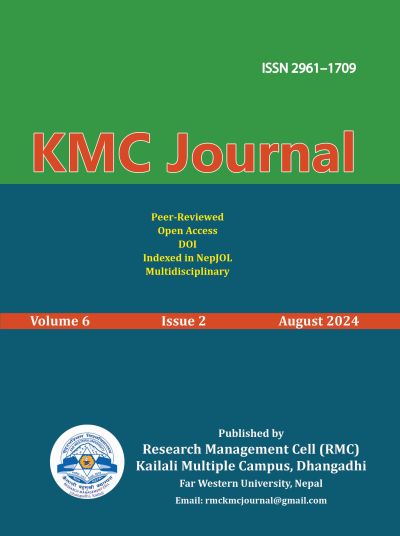Unveiling Body Politics: The Grotesque and Alienated Representation of the Monster in Mary Shelley’s Frankenstein
DOI:
https://doi.org/10.3126/kmcj.v6i2.68898Keywords:
Biopower, body politics, cultural anxieties, empathy, OthernessAbstract
Mary Shelley’s Frankenstein explores on the complexities of body politics and societal norms through the narrative of Victor Frankenstein and his creation, the monster. This research paper analyzes the novel through the lens of rejection, Otherness and the societal constructs of beauty and acceptance. The research investigates on the intricate intersections of various discourses in shaping the notion of “black body” throughout the nineteenth and twentieth centuries. Furthermore, it highlights on how Shelley’s portrayal of the hideous and marginalized body of the monster in her text aligns with the ideological constructions of black bodies. The monster, with his physical deformities and alien appearance, serves as a powerful symbol of the Other, highlighting society’s tendency to fear and ostracize those who are different. Drawing on Julia Kristeva’s concept of “the abject,” Michel Foucault’s notion of “biopower,” and Freud’s idea of “uncanny,” this paper searches how Shelly’s text reflects broader cultural anxieties and critiques societal norms. Through a detailed analysis of textual evidences, including direct quotes from the novel, this paper examines the implications of the monster’s rejection to socio-cultural norms and the societal forces that shape his identity. The paper concludes that exclusion of Frankenstein’s creation from the society directly stems from the societal constructs and responses towards bodies. Perception of bodies reflects more about the culture observing them than bodies themselves. In its essence, Frankenstein stands as a poignant narrative about the dangers of marginalization and the importance of empathy and acceptance in a diverse society. This paper underscores the critical need to understand how societal constructs shape perceptions of marginalized bodies, paving the way for future research to explore these dynamics in contemporary contexts and to develop strategies for fostering greater inclusion and acceptance.
Downloads
Downloads
Published
How to Cite
Issue
Section
License

This work is licensed under a Creative Commons Attribution-NonCommercial 4.0 International License.
This license allows reusers to distribute, remix, adapt, and build upon the material in any medium or format for noncommercial purposes only, and only so long as attribution is given to the creator.




